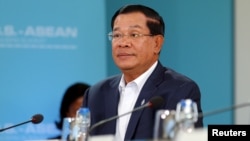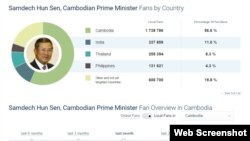A photograph of a truck grinding along the road surface on a bridge went viral last month among outraged Cambodian netizens. The truck was overloaded, and was doing damage to the Neak Leung Bridge over the Mekong river, which was paid for with development assistance from Japan and opened to traffic less than a year ago.
It wasn’t long before both Prime Minister Hun Sen and Interior Minister Sar Kheng had chipped in, calling for action from officials at the Ministry of Public Works and Transportation, who are responsible for making sure that trucks are appropriately loaded so as to protect the nation’s already deficient road network from unnecessary damage.
Hun Sen used a public speech to say that the ministry had received an “F” grade. The minister should watch out for an possible midterm cabinet reshuffle, he warned.
Following the close-run national elections of 2013, the long-ruling prime minister pledged to initiate deep reforms in an effort to prevent a further slide in popularity for his Cambodian People’s Party (CPP). The country’s transport infrastructure ranks alongside corruption, land disputes and other social injustices as major popular concerns that the government will need to address.
The ruling party, and businesspeople with close ties to CPP officials, still dominate the country’s broadcast media and much of the Khmer-language print media. But the medium of choice for Hun Sen right now is Facebook, a social network that he only began officially using about six months ago.
It’s easy to see why. The number of Facebook subscribers in the country reached 6.7 million by the end of 2015, according to the Telecommunication Regulator of Cambodia. A study by the Asia Foundation in September found that Facebook’s importance as a new source is soaring among Cambodians, especially young people.
Hun Sen’s page has amassed some 3 million followers (although new data suggests much of this might be paid-for popularity).
The self-styled strongman has responded to Facebook commenters’ complaints to call for a toll on the road between Phnom Penh and Sihanoukville to be lifted. He used his page to receive opinions from the public and ease the introduction of a new traffic law at the start of this year.
Seemingly spurred on by these and other online achievements, the prime minister told the public to file all complaints and concerns about the government and its services—along with evidence—directly to his inbox. He has also ordered ministries and public institutions to form their own “Facebook watchdog” groups in order to keep track of the public’s concerns and respond to them. Just a day after it received the bad rating from Hun Sen, the ministry responsible for transport formed such a group.
In his own Facebook intervention on Tuesday, Information Minister Khieu Kanharith—a relative innovator among CPP officials who has used the platform for years as a communication tool—predicted that the prime minister’s initiative would work as a kind of shock therapy for officials guilty of “sycophancy” toward Hun Sen.
“When the prime minister accepts complaints into his inbox regarding any law violation, let’s see if Mr. ‘Eb’ and Mr. ‘Orb’—[government officials] who always blame the media’s negative reporting [for problems]—have any other excuses to complain about,” Kanharith wrote.
Keeping Up With Technology
CPP spokesman Sok Eysan said the government was showing its willingness to reform by embracing digital tools.
“A number of problems have already been addressed, but the advancement of technologies has pushed Samdech Hun Sen to learn about the effectiveness of electronic systems,” Eysan told VOA Khmer. “That’s why he turned online to get faster access to information and people’s suggestions.”
“Of course, we started late, but we’re now moving faster,” Eysan added, in reference to the early adoption of online technologies by other politicians like opposition leader Sam Rainsy.
Hun Sen’s number of “likes” on Facebook recently overtook the number on Rainsy’s account. But allegations have surfaced suggesting Hun Sen’s online popularity, which appeared to rocket over recent months, is not what it seems.
According to statistics provided by Prague-based social marketing firm socialbakers.com, published by the Phnom Penh Post on Wednesday, a large proportion of Hun Sen’s recent followers were not actually users inside Cambodia, suggesting the prime minister might be paying for “likes.”
The CPP has denied the claim. For his part, Hun Sen said recently, via Facebook, that he was not using the site “to compete with anybody.” “My Facebook page is for addressing people’s concerns and problems,” he claimed.
Committed to Reform?
Eng Chhai Eang, a lawmaker with the Cambodia National Rescue Party who heads the National Assembly’s complaint-acceptance commission, said the CPP’s apparent newfound zest for reform was much needed, especially after the loss of public support shown at the 2013 elections.
“When all the cases of problems come to be settled at the prime minister’s level, it means public administration of the state is inactive,” Chhai Eang said. “That’s something must the royal government and the prime minister have to consider.”
However, he cast doubt on whether the current government was really addressing some of the country’s serious problems.
“Some strongly-rooted problems have yet to be effectively solved,” Chhai Eang added. “But if the government has true willingness to go with technology, we believe more good governance, transparency and accountability will come from our civil servants.”
Koul Panha, executive director of the Committee for Free and Fair Elections in Cambodia, said that the Facebook initiative may merely be an attempt to win popularity, rather than a genuine effort for reform.
“Political pressure from the rise of the opposition pushes the PM and his ruling party to be more responsive,” Panha said. “His presence on Facebook is only to gain support by showing his administration’s responsiveness.”
A true reform plan, said Panha, would “involve investing resources, putting the right people into implementation [of reforms] and so on, going systematically with a particular time frame.










